The Pigpen
Oliver & Naomi Clarke
 Bridge - A Lifelong Passion
Bridge - A Lifelong Passion
Bridge is an endlessly fascinating game. Played competitively, it's the only card game that is 100% skill and with no luck whatever involved. I've been playing Bridge for well over 50 years now, much of it at a pretty high competitive level, and I still learn something new every time I sit down for a game, particularly where the play of the cards is concerned. 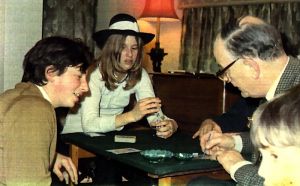 My love of the game of Bridge hit me at an early age. My father enjoyed playing a very simple kitchen Bridge and he had taught my elder siblings Stephen and Diana how to play but they were getting fed up playing 3-handed Bridge, which is a very frustrating game, and so they taught me to play at a very tender age. I was completely hooked within about 20 minutes and used to badger the rest of them for a game as often as I dared. In time my younger brother Paul also entered the fray and that gave my father a bit of time off. This pattern continued right through my teen years. Stephen, Diana, Paul and I would sometimes start playing about 8pm and still be at it in the early hours of the next morning. In those early days we played a relatively simple, natural form of bidding based on Acol. "We play BRIDGE, not conventions", my father used to declare. In time, though, we started adding a few rudimentary gadgets to our bidding arsenal.
My love of the game of Bridge hit me at an early age. My father enjoyed playing a very simple kitchen Bridge and he had taught my elder siblings Stephen and Diana how to play but they were getting fed up playing 3-handed Bridge, which is a very frustrating game, and so they taught me to play at a very tender age. I was completely hooked within about 20 minutes and used to badger the rest of them for a game as often as I dared. In time my younger brother Paul also entered the fray and that gave my father a bit of time off. This pattern continued right through my teen years. Stephen, Diana, Paul and I would sometimes start playing about 8pm and still be at it in the early hours of the next morning. In those early days we played a relatively simple, natural form of bidding based on Acol. "We play BRIDGE, not conventions", my father used to declare. In time, though, we started adding a few rudimentary gadgets to our bidding arsenal.Our aunts Miggs and Betty and Betty's daughter Celia were also keen players and we quite often trooped off to their house in Slough for an afternoon Bridge. I also found outlets for my passion for Bridge at the Dragon School and at Westminster, but it wasn't until I went to Manchester University in 1974 and started playing at the University Bridge Club in the Students' Union that I was introduced to competitive Bridge and learned that there was a whole battery of different bidding systems, conventions etc. I also found out that there was a whole lot more to the play of the cards then taking a simple finesse! It was at University that I really started to learn the game properly and by the time I left I had a pretty good grounding in Acol and the basic rudiments of card-play, but I had also seen the possibilities of a relatively new bidding system called Precision Club, which had exploded onto the world stage in the late 1960's and early 1970's thanks to the Taiwanese Bridge Team and then the Italian Blue Team.
Bury Athenaeum
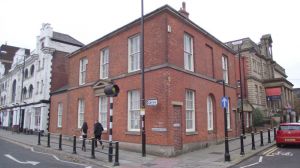 When I graduated from Manchester University I joined Greater Manchester Police in October 1977 and moved into the singlemen's hostel attached to Bury Police Station. After my initial training I was posted to Bury and stayed in and around the Bury area right up till 2005. There was no proper Bridge Club in Bury at the time. Instead there was The Bury Athenaeum, where a few old farts used to gather for a game of billiards and occasionally a few tables of rubber bridge.
When I graduated from Manchester University I joined Greater Manchester Police in October 1977 and moved into the singlemen's hostel attached to Bury Police Station. After my initial training I was posted to Bury and stayed in and around the Bury area right up till 2005. There was no proper Bridge Club in Bury at the time. Instead there was The Bury Athenaeum, where a few old farts used to gather for a game of billiards and occasionally a few tables of rubber bridge.I started going along there and eventually persuaded them to try having pairs events once or twice a week. I also started teaching beginners the rudiments of the game. I hooked up with Chris Stuart and between us we dragged the Athenaeum into being a proper full-blown Bridge Club. The billiards table went.
We completely refurbished and refurnished both floors and over the next 10 years the Club went from having between 3 and 8 people sitting around, playing billiards or rubber bridge, to a modern, comfortable Bridge Club with duplicate 4 or 5 nights a week, teaching classes at various levels on a couple of nights a week, and upwards of 60 people attending on the busier nights.
I had a number of regular partners during my time at the Athenaeum besides Chris Stuart, but all of those partnerships were playing variants of Acol with multiple gadgets. Although I had been weaned on natural approach/forcing bidding, I thirsted for something more scientific and 'precise'. I was busy developing and licensing conventions such as the 2-way Two Diamond response to 1NT that my system still uses today. Besides getting into teaching Bridge, I also got into Tournament Directing in a big way and even started teaching people to direct tournaments in classes I ran at Bury Athenaeum.
In those days I was playing Bridge at every opportunity, travelling to congresses around the northwest of England. I'd also head around to the Young Chelsea Bridge Club in London any time I was down there visiting my parents. It's great being a bachelor with no family responsibilities LOL!
I even found a further Bridge connection within my family: Liz, my younger brother Paul's first wife, was the cousin of Sally Horton (as she was then), and I once spent a fascinating and enthralling evening playing a foursome with Sally, Tony Forrester and Raymond Brock at Sally's home when on my way to a tournament in the area.
Precision Club
I'd been introduced to Precision Club in the mid 1970's at Manchester University, but it wasn't until I was at the Athenaeum that I decided that Precision was going to be a lot more fun that Acol. I struck up a partnership with Bob Bradbury and developed the infant version of the Super-Precision system I play and teach today. The basis of this was Eric Jannerstern's excellent book called Precision Club, which included a description of the Asking Bids. You might ask why I didn't go to the source and use Garozzo and Belladonna's definitive description of Super-Precision, but the simple answer is that I found Jannerstern's description easier to follow at that stage.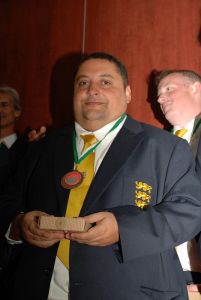 Bob and I played together for a few years and then work took him away from my area. I was also occasionally bidding and discussing Precision with my younger brother Paul, but the fact that he lived in Essex and worked in Cambridge was a slight geographical barrier. The Cambridge Heart Complex was Paul's concept, for example. I needed a regular Precision partner in the North-west, however, and happened to get chatting to Jason Hackett one day. Back then Jason and his brother Justin were still at school and members of the England Junior Squad. Jason and I struck up a partnership and we spend a number of months developing and fine-tuning the Super-Precision system I'd developed with Bob Bradbury. This was back before the days of Bridgebase Online and so I persuaded my younger brother to print reams and reams of randomly-dealt hands with which we could practice the system.
Bob and I played together for a few years and then work took him away from my area. I was also occasionally bidding and discussing Precision with my younger brother Paul, but the fact that he lived in Essex and worked in Cambridge was a slight geographical barrier. The Cambridge Heart Complex was Paul's concept, for example. I needed a regular Precision partner in the North-west, however, and happened to get chatting to Jason Hackett one day. Back then Jason and his brother Justin were still at school and members of the England Junior Squad. Jason and I struck up a partnership and we spend a number of months developing and fine-tuning the Super-Precision system I'd developed with Bob Bradbury. This was back before the days of Bridgebase Online and so I persuaded my younger brother to print reams and reams of randomly-dealt hands with which we could practice the system.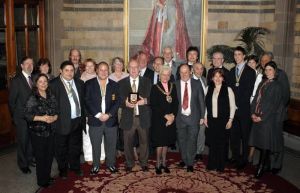 Once we started using it in anger, Jason and I played lots of pairs events and we teamed up with Justin and the twins' father Paul for teams events and the Manchester League. Occasionally, when Jason and Justin had matches coming up, they'd partner each other and I'd partner Paul, but normally Jason and I were able to play our system.
Once we started using it in anger, Jason and I played lots of pairs events and we teamed up with Justin and the twins' father Paul for teams events and the Manchester League. Occasionally, when Jason and Justin had matches coming up, they'd partner each other and I'd partner Paul, but normally Jason and I were able to play our system.In the early 1990's I met my future wife Naomi. She didn't play Bridge and had no real interest in learning, and so spending every available evening playing Bridge and every available weekend travelling around the UK for congresses wouldn't really have been fair. I couldn't have coped with just playing occasionally so I stopped playing face-to-face bridge entirely.
OkBridge and Bridgebase
After a time away from face-to-face Bridge, my thirst for Bridge asserted itself once again, and I played for a while on OkBridge. That was okay as far as it went, but I found the atmosphere there hopelessly cliquey and arrogant, especially the "rating" system in use there at the time. If your rating (based on hands played to date) was 0.01 too low some people would refuse to let you sit at a table. The fact that I was a National Master at the time had no effect :). As the way OkBridge ratings were calculated was fundamentally flawed (as described by a statistician friend of mine who played there), I left OkBridge and started playing on Fred Gitelman's excellent Bridgebase Online site which was then relatively in its infancy.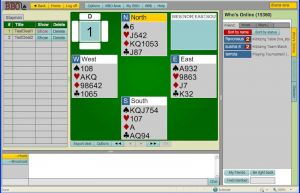 Bridgebase was like a breath of fresh air and rapidly became, and remains, the premier online Bridge site. World class Bridge players use it and the interface was very slick and professional compared to OkBridge. I found lots of my F2F friends playing on there and felt instantly at home. The facilities on Bridgebase are, quite simply, superb: Besides the Main Bridge Club, there are numerous clubs devoted to teaching or to particular systems. Tournaments of all varieties are going on every minute of every day. You can arrange Teams Matches, play rubber bridge and even play against robots. There are partnership bidding tables at which you can practice bidding, either with randomly-dealt hands or hands of a type that you pre-determine. Lastly, every major Bridge event around the world is covered by the Bridgebase VuGraph team and displayed online with expert commentary to boot.
Bridgebase was like a breath of fresh air and rapidly became, and remains, the premier online Bridge site. World class Bridge players use it and the interface was very slick and professional compared to OkBridge. I found lots of my F2F friends playing on there and felt instantly at home. The facilities on Bridgebase are, quite simply, superb: Besides the Main Bridge Club, there are numerous clubs devoted to teaching or to particular systems. Tournaments of all varieties are going on every minute of every day. You can arrange Teams Matches, play rubber bridge and even play against robots. There are partnership bidding tables at which you can practice bidding, either with randomly-dealt hands or hands of a type that you pre-determine. Lastly, every major Bridge event around the world is covered by the Bridgebase VuGraph team and displayed online with expert commentary to boot. With all this going on, it's little surprise that Bridgebase is the world's No 1 Bridge Site. At any given time of the day there tend to be in excess of 15,000 people playing or watching bridge on Bridgebase.
With all this going on, it's little surprise that Bridgebase is the world's No 1 Bridge Site. At any given time of the day there tend to be in excess of 15,000 people playing or watching bridge on Bridgebase.
Teaching Super-Precision
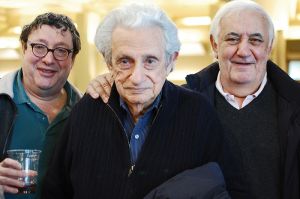 After a while I started teaching in the Beginner-Intermediate Lounge (BIL) At first I felt that the people using BIL wouldn't be ready for Super-Precision, and the first couple of courses I ran were on bog standard Wei Precision. I found that frustrating, though, because I was aware that there was so much more available.
After a while I started teaching in the Beginner-Intermediate Lounge (BIL) At first I felt that the people using BIL wouldn't be ready for Super-Precision, and the first couple of courses I ran were on bog standard Wei Precision. I found that frustrating, though, because I was aware that there was so much more available. The third course I ran was outlining a somewhat cut-down version of what Jason and I had played in Pairs events, what's now referred to as the 'Simple System'. This was well received and we soon had a hard core of about 8 people playing my Super-Precision system on Bridgebase. Some of those have fallen by the wayside over the years, but some are still playing the system and helping to support those who are learning it now. I also developed a Precision website to outline the system and support the courses.
After a few years in BIL I started teaching Super-Precision in the Intermediate Advanced Club (IAC) as well, but running two courses side-by-side got too much and I eventually stopped actively teaching in BIL, although I retain my links with the club. I've been running Super-Precision courses in IAC on and off ever since and even host a website for the IAC Club.
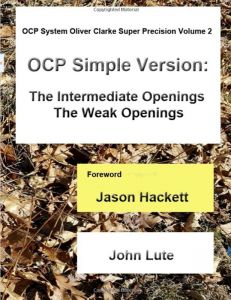 From that initial core of 8 people, the numbers in my Precision group now exceeds 30. We run teams in IAC and other team events and some of our group play the system face-to-face in mainstream ACBL events in the USA. We set up a Precision discussion forum where the system can be discussed, developed and people learning the system supported. Some of our group organise regular practices and John Lute (lute57 on BBO) has recently published the first two volumes of a 3-volume book on the system, which includes forewords from Jason Hackett and myself. This book is a real labour of love on John's part and I am most grateful for the time and trouble he's taken.
From that initial core of 8 people, the numbers in my Precision group now exceeds 30. We run teams in IAC and other team events and some of our group play the system face-to-face in mainstream ACBL events in the USA. We set up a Precision discussion forum where the system can be discussed, developed and people learning the system supported. Some of our group organise regular practices and John Lute (lute57 on BBO) has recently published the first two volumes of a 3-volume book on the system, which includes forewords from Jason Hackett and myself. This book is a real labour of love on John's part and I am most grateful for the time and trouble he's taken.